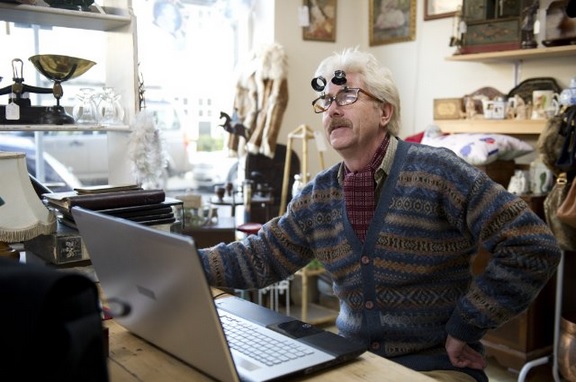HBO’s latest comedy, “Family Tree” by Jim Piddock and Christopher Guest, is gaining fans for its fun documentary style and charming story about a man who is searching for his identity through his genealogy. The show, which will take fans on a journey from rural England to America, will feature Civil War re-enactment enthusiasts, Native American culture, silent film stars and much more. ShockYa was happy to talk to Piddock about “Family Tree,” which he said will be “taking twists and turns and no one knows where it’s going to go, which is great.” “Family Tree,” which also stars Piddock as Mr. Pfister, airs on HBO Sundays at 10:30 pm ET.
What led to you and Christopher Guest creating “Family Tree”?
Jim Piddock: Well, Chris had been looking into his own family tree a little bit, and he called me. We had a lunch and he said, “What do you think about this whole general area for writing about?” I said I liked it and my instinct was that it’s not a film because it’s got no beginning, middle and an end and it’s got an ongoing, ever-expanding potential. We quickly realized that it had been a TV series. We’d never worked together before as writers; we’d worked together as actor and director. So we sat down and started playing around and in a short time we realized not only did we have something, but we had a lot of fun doing it.
What I like about the show is that it deals with genealogy, something I’m sure a lot of people are interested in now thanks to ancestry.com and other resources like that. I’m sure there have been other shows that have dealt with that in the past, but this is the most recent one I can think of that deals with this.
Jim Piddock: Yeah, I think it’s a hugely popular area, but in a funny way, the more universal part of it but is less the facts of your own family. I think what people relate to is the search for your own identity to that, through your genealogy or other ways. That’s really what Tom Chadwick, the main character [played by Chris O’Dowd], in “Family Tree” is trying to find is who he is and what his place is in the world and what is place is in this…chain of history. I think it’s absolutely 100 percent universal because we all…at one point our lives, experience that.
There are now a lot of documentary-esque shows on the air, like “Parks and Recreation” and “Modern Family” and “The Office,” which recently ended. In what ways do you think “Family Tree” puts a different spin on the documentary show?
Jim Piddock: Yeah, the documentary style…I think all those shows would hold their hands up and say they took their lead from Chris’ films…so I think in that sense, we knew we weren’t doing an original style because it had already been copied, but we did feel we had an original content and…I still think it’s not the same…how we do it. It’s just familiar now.
…In “The Office,” for example, they’re aware of the camera. They shoot looks for the camera. The premise is that this is a group of people who are being followed in some sort of reality show…so that is different for a start. I think we’re closer probably to the style of “Modern Family,” but the thing that we also fit in with “Family Tree,” that hasn’t been done in the other show is we do a walking-talking head which is very much what you would see in a real documentary, where you see people walking along the street and talking to a camera, but not directly, just kind of talking to the person who is there holding the camera. And that’s been useful because it’s a unique tool that I don’t think anyone else does and it helps move the story along and give you some kind of momentum instead of just having everyone sit and talk about what they’ve just done.
What’s it like writing this type of a show that just keeps building on itself and taking different avenues?
Jim Piddock: It’s fun for us. It’s very heavily layered and I think Chris and I are much more interested in a layer of jokes than…just writing empty one-liners. And the truth with his films is that they are incredibly enduring because people can watch them multiple times and see new stuff. I’ve had several people say that in the first three episodes, they’ve had to go back or stop because they were missing things. They saw jokes in the background, there were set jokes, there were…little things and that’s fun to us, to have props that are funny that people may catch or not catch. Hopefully, these [jokes] will last instead of being disposable one-liners.
How do you feel about the success of the show so far?
Jim Piddock: Well, I’m thrilled. Critically, the show has been pretty well received across the board, which is pretty exciting. It’s pretty exciting to hear people say it’s the best new show on television and [that] it’s the funniest thing since the UK “Office”…All that is really great and validating. On the other hand, we just have to get on with what we do and we have to have people watching the show and I’m not quite sure people have quite discovered it yet because, certainly in the way television is now, a lot of shows don’t really come with a big fanfare. You kind of discover it after it’s finished airing or during…Some of the biggest shows take a while to get their audience and I’m as guilty of anyone of that. I started watching “Breaking Bad” by the time it was in its third season and everyone had told me how great it was. There’s so much stuff out there, there’s so much being thrown at us. Television has to become habit forming or watched in a binge format so you watch it later. “Downton Abbey” is another one–I’d heard about it, I’d never watched it until it went on a paid distribution system.
You’re also filming “Think Like a Man Too” this month. Can you tease who you’ll be playing?
Jim Piddock: I’m playing Cedric’s butler, Cedric being played by Kevin Hart. So, I imagine, knowing Mr. Hart, that there will be quite a bit of improvisation [laughs], and knowing me. So I think it will be fun…I think it’ll be a blast.

